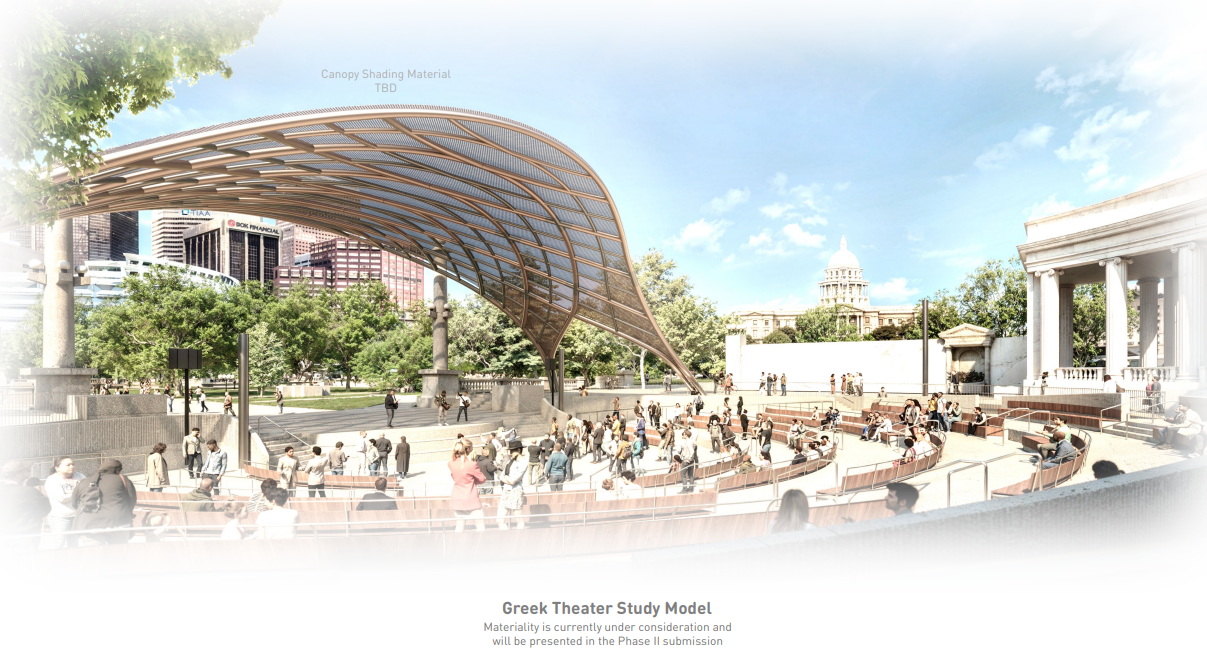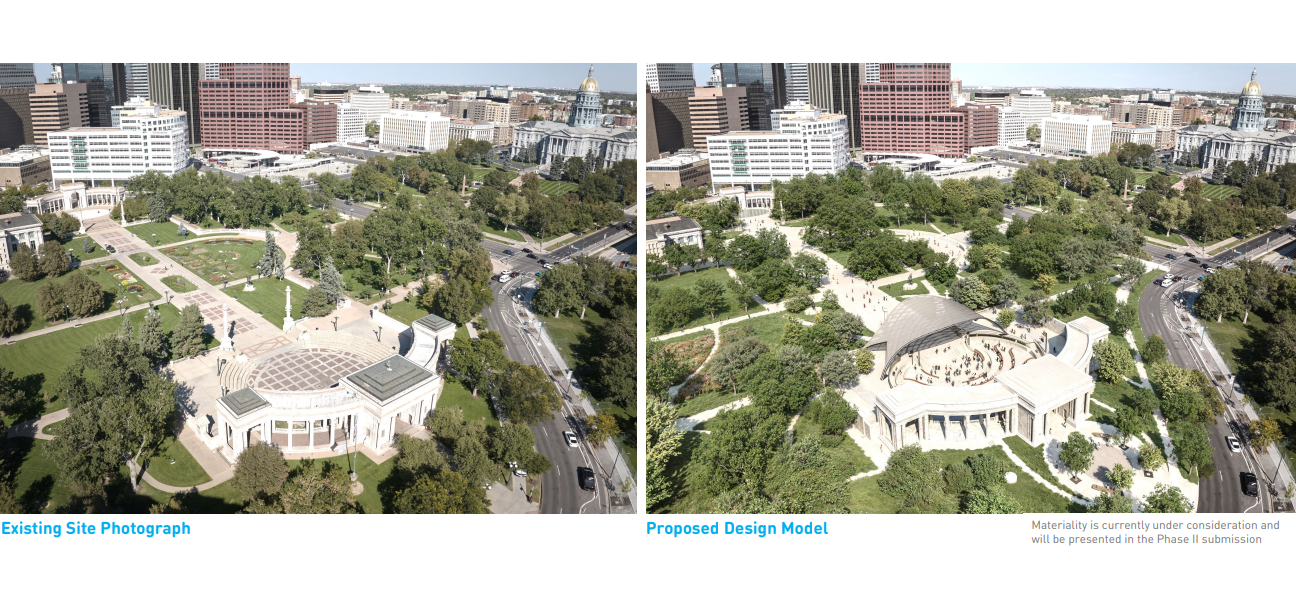
Brandon Marshall

Audio By Carbonatix
Denver’s Landmark Preservation Committee examined plans to revamp Civic Center Park on Tuesday, November 26, but the commission couldn’t get the votes needed to make a decision one way or the other, sending the ambitious plans back into limbo.
City officials and the Civic Center Conservancy, a nonprofit dedicated to programming activities in the park, have been developing the Civic Center Next 100 plan to rework the park at Denver’s city center since 2021, and plans were officially made public in October.
But those plans can’t come to fruition until the Preservation Commission approves them, as the park has been a city landmark since 1976.
After a week’s delay because not enough commission members were available to hold a meeting, six commissioners made it to the November 26 meeting. But five votes are needed to approve or deny plans, regardless of how many are in attendance, and the Civic Center designs only garnered four yes votes, with two commissioners – Graham Johnson and Rusty Brown – voting against them.
Along with pushing the decision back to a future meeting, commissioners shared thoughts on the proposal from Denver Parks & Recreation, which is headlined by a 180-degree flip of the historic Greek Theater at the southern end of the park.
As Westword reported in October, designs will alter the direction that the theater’s audience faces from south to north, and the stage’s opening from northward, as it is now, to south-facing. Designs show that the task will be accomplished by adding a new stage toward the center of the park so that the amphitheater bowl functions in the reverse of the way it does currently.

How the flipped stage and canopy could look.
Denver Parks & Recreation
Because the current orientation of the amphitheater requires the audience to face south, the sun is often in people’s eyes, according to Parks & Rec, when a typical theater situation should have lights shining at the performers instead of the audience.
The updated park designs came from Studio Gang architects and local expert Studiotrope, which designed Levitt Pavilion and many of the new Central Library upgrades. On the landscaping side, OLIN from Philadelphia and Mundus Bishop, a local firm helmed by Tina Bishop, who wrote the Civic Center design guidelines, weighed in.
Plans call for a new stage to be constructed opposite the current theater stage, with an arched cover over it. Although the structure around the amphitheater bowl is a historic landmark, the bowl of the theater was rebuilt in 2004 and is no longer considered historic, so adding seats and altering its orientation is allowed.
Every seat in the amphitheater bowl will be wheelchair-accessible, plans show, with appropriately sloped pathways around the outer edge of the amphitheater and the main seating bowl. Those paths will connect through to the southern plaza, something that currently is not possible for those who use wheelchairs.
To make the amphitheater accessible, a few historic materials will be removed under the current plan, according to principal city planner Brittany Bryant. The stairs on the south side of the Greek Theater will be removed to create a flat path that follows Americans With Disability Act guidelines.
“The applicant is going to demolish the stairs on the south side of the theater, but they are pretty large stone slabs, so those stones will be salvaged and relayed into a level path, creating that accessibility,” Bryant told the commission.

A few historic elements of the Greek Theater will be removed under the current plan.
Denver Parks & Recreation
Other elements of the Civic Center plan, like new garden spaces and a memorial to honor disability activists in the Gang of 19, are also proposed, but at the November 26 meeting, the commission was only reviewing the theater flip and the new pedestrian walkways proposed for the central promenade. The meeting was meant to be a review of the mass, form and context submission for the project, which is an overview of the plans. If it had passed, the team would have developed a more specific proposal and once again brought it before the commission for a final stamp of approval.
The final stamp of approval will likely have some hurdles, as even those who commented in favor of approval, like nonprofit Historic Denver, had suggestions for tweaks to the plan.
“The future design detail submission should provide information regarding materials throughout the scope to confirm they are of high quality and compatible with the historic context,” Historic Denver president and CEO John Deffenbaugh said. “Removal of materials will likely require adding new material to the base of the Greek Theater. Please clarify the approach to addressing exposed areas of the historic structure arising from regrading the site.”
Other members of Denver’s landmark preservation community aren’t happy at all. That includes Tom and Laurie Simmons, who contributed to the national historic landmark application for Civic Center Park through their company, Front Range Research Associates, which works on landmark preservation throughout the state.
“Civic Center is an incredibly precious resource,” Tom tells Westword. “It’s very intact. We shouldn’t be throwing things in to disrupt some of those things that make it special.”
In particular, the Simmonses don’t like the plan to reorient the Greek Theater; Tom says Denver is the only city in the country with a civic axis of a state capitol and city hall across from each other, as is the case for Civic Center Park. He thinks that axis would be disrupted if the city follows through with the plan to construct a canopy over the new stage at the center of the park.
Sarah McCarthy, a former commissioner, agreed in the public-comment portion of the meeting.
“I’m concerned that the proposal does not follow the intent of Civic Center Park, as opposed to other Denver parks in that it is intended to be a city-wide gathering spot,” McCarthy said. “It is intended to have that center area open to allow for hundreds of thousands of people, not 1,000 people or 10,000 people. I think that canopy interferes with that, as well as not being a neoclassical design or complementary to neoclassical.”

How the proposed design looks compared to the current design of Civic Center Park.
Denver Parks & Recreation
Comments submitted to the commission online detailed concerns that the plan reduces the capacity of the amphitheater, negatively affecting large events like Denver Pride, the Mile High 420 Fest and Denver’s Cinco de Mayo Festival.
Johnson said the park’s status on the National Register of Historic Places in addition to its city landmark designation was important to him when considering the project. In 2012, the park, structures in the park, the State Capitol Building, Lincoln Park, the City and County Building and several other nearby buildings were designated as a National Historic Landmark.
Red Rocks Amphitheatre is also a National Historic Landmark, and to flip its orientation would be unthinkable, Johnson said. He wasn’t sure if flipping the orientation of the theater maintains its historic integrity.
Commissioners Larry Sykes, Nick Foussianes and Emily Hazen acknowledged potential issues with the plan, like the exact scale of certain elements and some of the proposed removals of historic materials, but all three said they believed in the overall design and were comfortable with sending it to phase two. Commission Vice Chair Erika Warzel agreed.
“Civic Center Park has been a ‘problem’ that people have been trying to solve for decades, at least for the twenty years that I’ve been involved in preservation, or even longer, and this is probably the most sensitive design that I’ve ever seen come forward in trying to address those problems for Civic Center Park,” Warzel said before voting yes.
Those problems will have to wait another day, however, as the plans will now need to be heard by the commission again.
Bennito L. Kelty contributed to the reporting of this story.